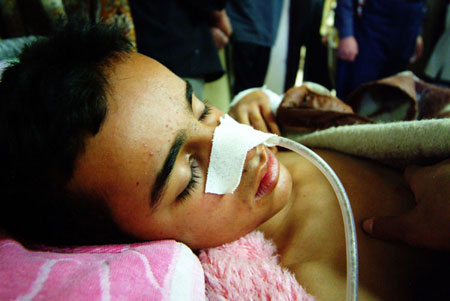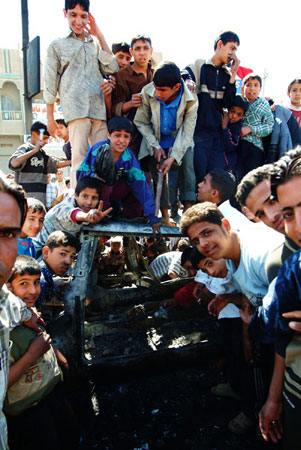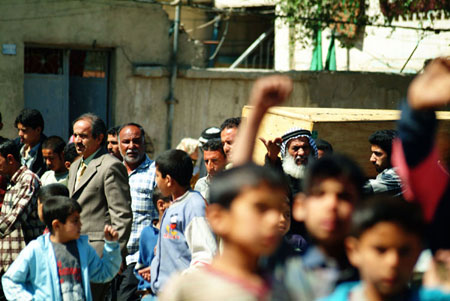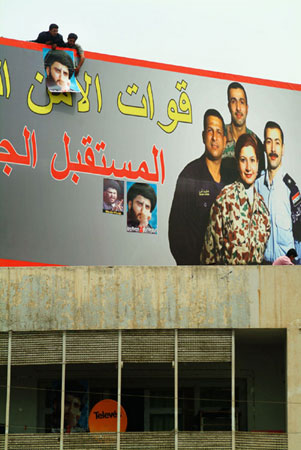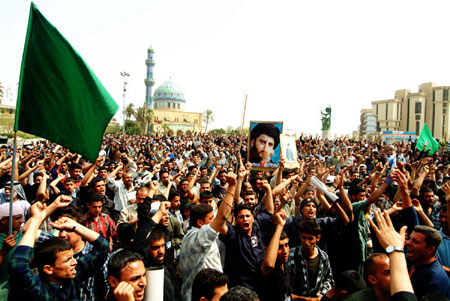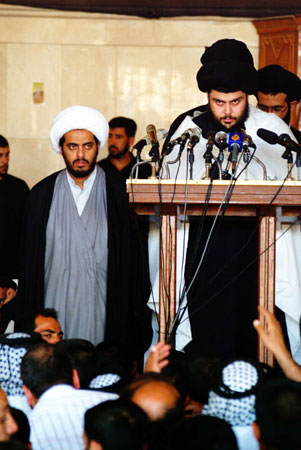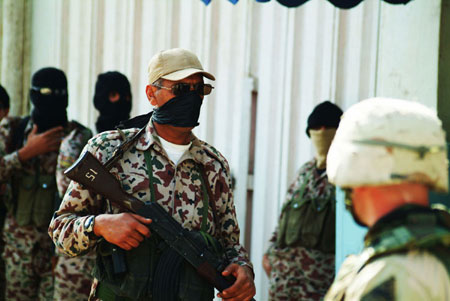Shia Uprising: Naomi Klein and Andrew Stern in Baghdad
Bremer is deliberately pushing Iraq's Shia south into all-out chaos
Story: Naomi Klein
Photos: Andrew Stern
**free usage for the Indymedia network. All others please contact me to use these photos for web or print.

On Sunday, Iraqi soldiers, trained and controlled by coalition forces, opened fire on a demonstration here. As the protesters returned to their homes in the poor neighbourhood of Sadr City, the US army followed with tanks, helicopters and planes, firing at random on homes, shops, streets, even ambulances. According to local hospitals, 47 people were killed and many more injured. In Najaf, the day was also bloody: 20 demonstrators dead, more than 150 injured.
In Sadr City yesterday, funeral marches passed by US military tanks and the hospitals were overflowing with the injured. By afternoon, clashes had resumed.
Make no mistake: this is not the "civil war" that Washington has been predicting will break out between Sunnis, Shias and Kurds. Rather, it is a war provoked by the US occupation authority and waged by its forces against the growing number of Shia who support Moqtada al-Sadr.
Sadr is the younger, more radical rival of the Grand Ayatollah Ali al-Sistani and portrayed by his supporters as a cross between Ayatollah Khomeini and Che Guevara. He blames the US for attacks on civilians; compares the US occupation chief, Paul Bremer, to Saddam Hussein; aligns himself with Hamas and Hizbullah; and has called for a jihad against the controversial interim constitution. His Iraq might look a lot like Iran.
And it's a message with a market. With Sistani concentrating on lobbying the UN rather than on confronting the US-led occupation, many Shia are turning to the more militant tactics preached by Sadr. Some have joined the Mahdi, his black-clad army, which claims hundreds of thousands of members.
At first, Bremer responded to Sadr's growing strength by ignoring him; now he is attempting to provoke him into all-out battle. The trouble began when he closed down Sadr's newspaper last week, sparking a wave of peaceful demonstrations. On Saturday, Bremer raised the stakes further by sending coalition forces to surround Sadr's house near Najaf and arrest his communications officer.
Predictably, the arrest sparked immediate protests in Baghdad, which the Iraqi army responded to by opening fire and allegedly killing three people. At the end of the day on Sunday, Sadr called on his supporters to stop staging demonstrations and urged them to employ unnamed "other ways" to resist the occupation - a statement many interpreted as a call to arms.
On the surface, this chain of events is mystifying. With the so-called Sunni triangle in flames after the gruesome Falluja attacks, why is Bremer pushing the comparatively calm Shia south into battle?
Here's one possible answer: Washington has given up on its plans to hand over power to an interim Iraqi government on June 30, and is creating the chaos it needs to declare the handover impossible. A continued occupation will be bad news for George Bush on the campaign trail, but not as bad as if the hand-over happens and the country erupts, an increasingly likely scenario given the widespread rejection of the legitimacy of the interim constitution and the US- appointed governing council.
But by sending the new Iraqi army to fire on the people they are supposed to be protecting, Bremer has destroyed what slim hope they had of gaining credibility with an already highly mistrustful population. On Sunday, before storming the unarmed demonstrators, the soldiers could be seen pulling on ski masks, so they would not be recognised in their neighbourhoods later.
The coalition provisional authority is increasingly being compared on the streets to Saddam, who also didn't much like peaceful protests, or critical newspapers.
In an interview yesterday, Iraq's minister of communication, Haider al-Abadi, blasted the act that started the current wave of violence: the closing of Sadr's newspaper, al-Hawzah. Abadi, who is supposedly in charge of media in Iraq, says he was not even informed of the plan. Meanwhile, the man at the centre of it all - Moqtada al-Sadr - is having his hero status amplified by the hour.
On Sunday, all these explosive forces came together when thousands of demonstrators filled Firdos Square. On one side of the plaza, a couple of kids climbed to the top of a building and took a knife to a billboard advertising Iraq's new army. On the other side, US forces pointed tanks at the crowd while a loudspeaker told them that "demonstrations are an important part of democracy but blocking traffic will not be permitted".
At the front of the square was the statue that the Americans put up in place of the toppled one of Saddam. Its faceless figures are supposed to represent the liberation of the Iraqi people. Today they are plastered with photographs of Moqtada al-Sadr.
J'ai entendu le son de la liberté dans le square Firdos de Bagdad, le lieu fameux où la statue de Saddam Hussein fut renversée, il y a un an. C'était le son des tirs de mitrailleuse.
Dimanche, des soldats irakiens sous la tutelle et le contrôle des forces de la coalition ouvrirent le feu sur une manifestation, ici. Au retour des manifestants chez eux, dans le quartier pauvre de Sadr City, ils furent suivis par les tanks, helicoptères et avions de l'armée US qui tiraient au hasard sur des maisons, des commerces, des rues, même des ambulances. Selon les services hospitaliers locaux, 47 personnes furent abbattues, et beaucoup d'autres, blessées. À Najaf aussi, la journée fut sanglante :20 manifestants morts, plus de 150 blessés.
Dans Sadr City hier [éd: lundi], les cortèges funèbres passèrent à côté des tanks de l'armée américaine, et des hôpitaux qui débordaient de blessés. Les batailles recommencèrent dans l'après-midi.
Faut pas se tromper : ceci n'est pas la « guerre civile » que Washington prédisait, entre chiites, sounnites, et kurdes. C'est plutôt une guerre provoquée par les autorités d'occupation américaines, menée par ses forces contre le nombre croissant de chiites qui supportent Moqtada al-Sadr.
Sadr, rival plus jeune et plus radical du Grand Ayatollah Ali al-Sistani, est dépeint par ses supporteurs comme un mélange d'Ayatollah Khomeini et de Che Guevara. Il blâme les É.-U. pour les attaques contre les civils et s'aligne avec le Hamas et le Hizbollah; il lança un appel au djihad contre la constiution intérimaire controversée. Son Irak pourrait ressembler fortement à l'Iran.
Et c'est un message avec un public. Pendant que Sistani se concentre sur le lobbying à l'ONU plutôt que sur une confrontation avec l'occupation dirigée par les É.-U., plusieurs chiites se tournent vers les tactiques plus militantes que prône al-Sadr. Certains se sont joint au Mahdi, son armée tout en noir qui revendique des centaines de milliers de membres.
Au début, Bremer répondait au pouvoir grandissant de Sadr en l'ignorant ; maintenant, il tente de le provoquer à une bataille sans limites. Toute l'agitation débuta avec sa fermeture du journal de Sadr, la semaine passée, ce qui fut suivi d'une vague de manifestations pacifiques. Samedi, Bremer fit encore accroître la tension en envoyant des forces de la coalition pour entourer la maison de Sadr, et arrêter son responsable de la communication [angl. : communications officer].
Comme on avait pu le prédire, cette arrestation provoqua immédiatement des manifestations à Bagdad ; l'armée irakienne y répondit en ouvrant le feu et, apparemment, en tuant trois personnes. À la fin de la journée, dimanche, Sadr appella ses partisans à mettre fin à leurs manifestations, et à utiliser -- sans les nommer -- d'« autres méthodes » pour résister à l'occupation : un message interprété par plusieurs comme un appel aux armes.
Sur la surface, cette série d'événements porte à confusion. Avec le « triangle sounnite » enflammé après les attaques dégoûtantes à Falloujah, pourquoi Bremer pousse-t-il le sud chiite, relativement calme, dans la bataille ?
Voici une réponse possible : Washington a abandonné ses plans de passer le pouvoir à un gouvernement irakien intérimaire le 30 juin, et crée maintenant le chaos nécessaire pour qualifier ce transfert d'impossible. Une occupation continuée n'est pas de bonne augure pour George Bush en campagne éléctorale, mais pas aussi mauvaise que si le transfert est effectué et que le pays explose, un scénario de plus en plus probable vu la réjection massive de la légitimité de la constitution intérimaire et du conseil gouvernant [angl. : governing council] mis en place par les É.-U.
Mais en envoyant la nouvelle armée irakienne pour tirer sur les gens qu'ils sont sensés protéger, Bremer a détruit le mince espoir qu'ils avaient de gagner de la crédibilité chez ce qui est déjà une population très méfiante. Dimanche, avant de charger les manifestants non armés, les soldats ont été vus en train de mettre des cagoules, pour ne pas être reconnus dans leurs quartiers, par la suite.
De plus en plus dans les rues, l'autorité provisoire de la coalition est comparée à Saddam, qui, lui non plus, n'aimait pas vraiment les manifestations pacifiques ou les journaux critiques.
Lors d'un interview hier, le ministre des communications irakien, Haider al-Abadi, s'attaqua au geste qui provoqua la vague de violence courante : la fermeture du journal de Sadr, al-Hawzah. Abadi, qui est supposément le chef des médias en Irak, dit qu'il n'avait même pas été informé du plan. Entretemps, l'homme au centre de toute cette affaire, Moqtada al-Sadr, voit son image d'héros s'aggrandir d'heure en heure.
Dimanche, toutes ces forces explosives étaient réunies lorsque le square Firdos fut rempli par des milliers de manifestants. D'un côté de la place, quelques enfants montèrent sur un toit pour s'attaquer, couteau en main, à un panneau-réclame de la nouvelle armée de l'Irak. De l'autre côté, les forces américaines visèrent la foule avec leurs tanks, tandis qu'un haut-parleur annonça que « les manifestations sont un élément important de la démocratie, mais bloquer le passage ne sera pas permis ».
En avant du square, on trouve la statue que les américains installèrent à la place de celle de Saddam, renversée. Ses figures sans visage représentent supposément la libération du peuple irakien. Aujourd'hui, elles sont couvertes de photos de Moqtada al-Sadr.
[Traduction libre de simms]
Ce texte fut publié mardi sur le réseau Indymedia, avec une note permettant son usage partout sur le réseau.
why is the us still there?
Irak is free now, the socalled security problem was made by the destruction of the state itself. So, the cause is the cure all togheter or what? I tell you one thing: get your ass out as soon as possible and concentrate on bin laden, before noone will like the usa and britain nomore. Enough, that there were years of sanctions and radiant bombings, now the promise of Freeing irak should be held, or this is really going to be a Vietnam for Bush. Anyway, the double-action of this bliar and bush friendship has proven no plans at all, wheter to bring peace nor to bring relief to the oppressed oriental state. The fate of suppression will only generate more hate, terrorism, congratulations Mr. Bush, more weapons contracts and invasions for you!
The resistance has been assuming different forms and paces according to the different circumstances and traditions. It ranged from street demonstrations for the withdrawal of the foreign troops, passing by social protests against the inability und unwillingness of the occupants to provide elementary social services let alone employment, until outright guerrilla warfare. Despite the overwhelming technical superiority the partisan movement has been proving to be able to inflict steady losses to the occupation forces. Thus the American attempt to quickly pacify the invaded nation and to build a subservient puppet regime is in great jeopardy. Consequently they keep having great troubles to mobilise their allies and servants throughout the world to back the occupation. And even within the US the recruitment of soldiers is facing difficulties while the morale of their troops becomes more and more strained.
The town of Falluja is the emblematic stronghold of the Iraqi resistance. The occupants were forced to withdraw from the city already by last autumn limiting themselves to daylight patrolling. The support of all strata of society for the armed resistance is overwhelming. But Falluja is only one outstanding example for a tendency affecting the entire country.
The occupation forces are attacking Falluja to collectively punish the population for their resistance in order to send a strong warning to the entire Iraqi people: “If you continue your liberation struggle we will continue the genocide which we inflicted upon you during the 90s.” Now they employ the methods developed by the Zionists to oppress the Palestinian people. Falluja is being sealed off, besieged, residential quarters are cowardly being bombarded by tanks and helicopter gunships. Ambulances carrying the wounded are being attacked by snipers. There is neither supply of water nor of food. Already several hundred Iraqis have been killed and many more wounded.
On the political level the US-installed Governing Council is completely isolated – and even these puppets who need permanent protection by the occupation forces showed reluctance to defend the ongoing American massacre.
The only asset remaining in the hands of the occupants is the tacit agreement with the Shia cleric leadership around Ayatollah al-Sistani to hold controlled elections in order to legitimise a dependant government which nevertheless can count on some popular backing. The differences with the US were only on the price they would have to pay to the collaborators. However, the current events could put into question also this deal.
Up to now the main problem of the resistance movement has been its difficulties to form a united resistance front as the embryo of a really independent state. The differences between the four main currents of the resistance seemed to have prevented such a political counter power. The Arab nationalists drawing their strength from former army soldiers and officers emerging from the milieu of the Baath party were apparently only able to find an agreement with the Sunni Islamic currents. Between both there is no clear line of division and they are strongly intermixed like the example of Falluja displays. The prime trouble was to bring in a part of the Shia cleric leadership opposing the occupation. While the Shia urban poor were burning to enter into the struggle the leadership around Muqtada al-Sadr oscillated and hesitated. He refused to participate at a common front. Also the smallest current of the resistance composed of dissident communists is hesitant to co-operate with former Baathists who used to violently oppress them.
The only perspective being able to confront the danger of US sponsored election on one hand, and to unify the resistance forces in a common front basing themselves on the popular masses on the other hand is the struggle for a constituent assembly. Non of the four currents of resistance has put this demand in the centre of their strive. This is the main weakness of the resistance.
But with the current uprising led by Muqtada al-Sadr everything might change. As he and his cleric group was more and more squeezed between the hammer of the occupation force trying to contain his influence and the anvil of the Shia urban poor demanding action to confront the occupants, he was simply forced to act. The mass demonstration and the brutal massacres of the occupation forces developed a dynamics into an outright popular uprising.
In Baghdad as well as in most of the predominantly Shiite cities al-Sadr’s militiamen attacked and often conquered the administration installed by the occupants. The uprising which runs in parallel with the popular defence of Falluja being collectively punished by the occupants as well as with an intensified guerrilla war has been unfolding powerful dynamics. It carries away also important parts of the impoverished middle classes who have been so far loyal to the collaborationist tendencies of the clerics. In many places even the US-led Iraqi police forces switched sides.
The parallel confrontations with the US occupants is helping to bridge the gap between what the Western media like to portray as the Sunni and the Shia leaderships. (Though it is true that the two leaderships base themselves mainly on those communities it is not a sectarian conflict. It is the Americans who try to use the conflict and transform it into something they happen to call “ethnic” – an operation of divide and rule.) On the contrary there have been powerful signs of solidarity and closing of ranks for example the march of relieve to Falluja explicitly led by both communities and well as the enthusiastic welcoming of the uprising by the guerrilla forces.
Since months the corporate Western media speak of the danger of a civil war systematically building an argument for their occupation troops to remain in Iraq. The merging of the guerrilla with the popular uprising is the exact contrary – unity of the people against the occupants.
The warmongers of the American Empire call and apparently prepare for a bloodbath in Iraq to crush the resistance. But the world understands that the US will not be able to continue its unilateralist stand. Otherwise it will risk a new Vietnam. In order to avoid that they will try to bring in their allies by making some concessions and granting a stronger role to the UN. At any cost they want to prevent that for example Spain really pulls out its troops initiating a domino effect.
Therefore the international movement against the occupation must oppose any agreement with or without the UN which does not provide for the total withdrawal of all foreign troops. The full right of self-determination must be granted to the Arab Islamic world and especially the Iraqi and Palestinian people.
Stop the imperialist massacre in Iraq!
End the occupation – all foreign troops out!
Support the resistance of the Iraqi people till the victory!
Down with the American Empire!
The theory that the current wave of violence suits the coalition forces seems to hold water. There is the general, almost Orwellian, sense of rolling warfare that helps maintain the blurred 'democratic' edges to which the Bush administration aspires (both in the U.S. and in the 'west'). This allows for the creation of simplistic for us/against us dichotomies etc. Then there is also the immediate benefit in providing a 'credible' backdrop to the non-handover of power in June (which would have been a sham in any case).
In terms of the U.S. media currently lacking an effective narrative (which is to suggest that the Bush administration don't know where events are taking them at the moment). I am not so sure. If the coalition has completely lost it's way, then I am incorrect. But ... with Saddam Hussein locked up and Bin Laden who-knows-where, the coalition, (and Bush), need a face and a name to focus on. I hope, for his own sake, that the coalition is not setting Moqtada al-Sadr up into this position, just so they can knock him down.
Of course, the greatest irony is that the coalition's main achievement seems to be that it may have actually unified the Sunni, Shi'ite and Kurdish populations, albeit in violent resistance to the presence of the coalition occupying forces in their country. In upcoming US presidential election would Bush have the temerity to suggest that, as a long term solution, that was their intention all along??
I wouldn't laugh...
JJ
Nothing positive is going to happen in Iraq until Bush is ousted, but what then will Kerry do? How can such a course be reversed. As with Bush's ongoing environmental and financial machinations, we are looking at generations of work to repair this mess.
I am saddened and sickened by current events. The questions discussed here are relevant-- does the Bush administration have interests in continuing the violence and war in Iraq, or in getting out by June 6th which no longer looks possible.
The US military complex's one and only goal is to control Iraq. (well and maybe the world) Beyond that I dont see it thinking strategically at all. They shut down the oppositions newspaper because it pissed them off. I dont think they did it to provoke an rebellion. They are now bombing, burning and looting because the damn Iraqis will not behave and play democracy with them (in their game people have to wait a year and a half before they can vote). They are warmongers and they dont know any other moves. Its violent aggression or more violent aggression. If you kill enough people no one will protest anymore this is their one and only definition of democracy!
(think about it: can you think of a more undemocratic organization than the military??? What the hell are we doing giving them 87 billion dollars to set up a democracy in a country where they dont know the culture or language??)
The rest of us look at current events and think they must be either out of their minds or trying to provoke violence. I have no doubt that they do provoke violence and that that is part of their game but its also the only tactic they know (violence begets violence), they arent trained in conflict resolution or grassroots democracy. They are trained at war, and now after a year of provocation they finally got what they came for-- a war!
I think we should be clear about comparisons of this situation to Vietnam. Look at Geography. Iraq is not Vietnam. It is a powder keg surrounded by powder kegs.
Lastly, the mosque in the photo-- is that the same mosque the US bombed? Idiots!!!!!!! Provocation or retaliation? I'd say retaliation. How dare people who disagree with them pray together.
I fear its going to be a long war.
All the withdrawal of western forces will accomplish is a return of Iraq to the dark days of oppression under the thumb of either one its Arab neighbors, or the establishment of one or more theocracies such as Iran, and the likely split of Iraq into more than one country, the Kurds likely siding with the US to protect their interests. Neither one of which will result in real freedom for the Iraqi Sunni or Shi'a people. The only ones likely to truly be free are the Kurds, and that will simply be stopped by the Turks and Syrians who do not want a free Kurdish state. Without some federal form of government in Iraq, everyone could lose in Iraq.
Stop fanning the flames of opression by assuming this is about anti-imperialism. Running away from Iraq and leaving them to flounder in civil war is horribly unethical. Its lighting the match and throwing it into the gas soaked house.
If we were truley living in a democratic society, why wern't the citizens of America asked if they wanted to wage war or not? We have got to stop letting a handfull of twisted, rich bureaucrats control the lives of 6 billion of us!!!!! We don't want war!!!!!!! Get it??! PEACE!
[This is the print version of story http://www.abc.net.au/news/newsitems/s819685.htm]
US soldiers in Iraq asked to pray for Bush
They may be the ones facing danger on the battlefield, but US soldiers in Iraq are being asked to pray for President George W Bush.
Thousands of marines have been given a pamphlet called "A Christian's Duty," a mini prayer book which includes a tear-out section to be mailed to the White House pledging the soldier who sends it in has been praying for Bush.
"I have committed to pray for you, your family, your staff and our troops during this time of uncertainty and tumult. May God's peace be your guide," says the pledge, according to a journalist embedded with coalition forces.
The pamphlet, produced by a group called In Touch Ministries, offers a daily prayer to be made for the US president, a born-again Christian who likes to invoke his God in speeches.
Sunday's is "Pray that the President and his advisers will seek God and his wisdom daily and not rely on their own understanding".
Monday's reads "Pray that the President and his advisers will be strong and courageous to do what is right regardless of critics".
Mission Accomplished!!!
: )
I am university educated and quite certain that many citizens of Australia would be horrified to have your type of "democracy" land on their doorstep. Not John Howard mind you, he's as self-serving "downunder" as George W. Bush is in America, with a steadily diminishing credibility rating. If it weren't for questionable electoral "victories" it is unlikely much of the world's intelligentsia would bother with comments from either you or Mr. Howard.
Besides, for quite some time, the only opinion John Howard has had on Australian foreign policy is a new rendition of "all the way with LBJ", this time with GWB. His obsequiousness is reaching ludicrously epic proportions, mimicking your stage-managed trips to Iraq, maintaining "resolve" and refusing to "cut and run". Can't you at least do something about letting Australians vote in US elections? Many of us feel like the 53rd state, or 54th, or 55th or whatever you're up to in your vicious game of empire.
This must be one of the perks of the job: to get leaders of other countries to lie and cover for your every mistake.
Other countries coerced by America's fearsome military to advance your corporate avarice (the Carlyle group/HELLiburton/Bechtel, etc), could perhaps blame their or your limited understanding of the English language.
Maybe you/they got it wrong; perhaps you meant it was Israel (not Iraq) that was hiding weapons of mass destruction and not allowing inspections. And maybe it was Saudi Arabia (not Iraq) that could be linked to the hijacking of planes on 9/11. What happened to the weapons of mass destruction? Will they turn up at the white house to be resold to Libya?
Spain, demonstrating their good sense, pulled out of the quagmire as soon as they could vote in someone not on your payroll.
Humans eagerly await your next move, Mr. Bush. Yes, we all know you are important. Many of our lives are in your hands, mind and mouth, giving some cause for concern. Please look into that curly question about whether or not you made any mistakes before, on or after 9/11. Maybe ask God if you got the message right. Wouldn't you rather your children grow up proud of your legacy, rather than discover that history places you next to other maniacs with a vision not for all mankind, but only for power and money?
But in the meantime at least, please stop redefining the English language. Not even a loony would call what is happening in Najaf, Fallujah or Baghdad remotely resembles the kind of democratic land of opportunities you'd want to settle with your family, or would you? Go on George, lead by example. Go and walk the streets of Najaf and tell the people how lucky they are to have a democracy of your making :>)
p.s. sorry if this has been too long or difficult to read.
the body is the illuminati bush and blair are of the body elders of zion are the ehads over the body
i never trust one who spells irak its a illuminati code
he is manipulative and smooth talking and not to be trusted
women beware
Get Involved
If you'd like to help with maintaining or developing the website, contact us.
Publish
Publish your stories and upcoming events on Indybay.


